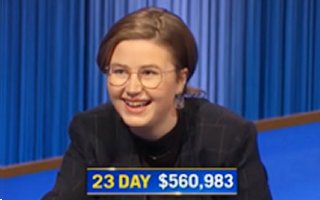20th Century Pulitzer Prize Winning Playwrights
How does one go about getting a handle on Pulitzer Prize winners? Whether you want to know this information because you are a Jeopardy! hopeful or just to increase your knowledge, or for whatever reason, there’s an awful lot to know. The Journalism category alone currently has 14 subcategories. The Letters, Drama and Music category has 7 categories, and there are also Special Citations!
In this post, let’s just take a look at plays. Maybe that’s the best one to get a handle on and familiarize oneself with the winners. We can tackle the others some other time.
The Pulitzer Prize for Drama was was first introduced in 1918. What follows is a list winners in the 20th century by decade. Plays with an asterisk have all been the subject of Jeopardy! clues. They can show up in “Pulitzer Prize-Winning Dramas,” “Pulitzer Prize-Winning Plays,” “Theatre History” or just about any category on American literature. Sometimes, a whole category has been devoted to a very well-known playwright.
*1918 – Why Marry? – Jesse Lynch Williams
Of course, you would expect Jeopardy! to cover the very first play that won the Pulitzer and they did in a match on 4/5/1990 in the category “Theatre” (a $100 clue).
1920s
*1920 – Beyond the Horizon – Eugene O’Neill
1921 – Miss Lulu Bett – Zona Gale
*1922 – Anna Christie – Eugene O’Neill
*1923 – Icebound – Owen Davis
*1924 – Hell-Bent Fer Heaven – Hatcher Hughes
1925 – They Knew What They Wanted – Sidney Howard
*1926 – Craig’s Wife – George Kelly
1927 – In Abraham’s Bosom – Paul Green
*1928 – Strange Interlude – Eugene O’Neill
1929 – Street Scene – Elmer L. Rice
For obvious reasons, Eugene O’Neill dominates Jeopardy! clues on 1920s plays. Don’t forget he won in 1957, too! He’s had a whole category devoted to him twice.
1930s
1930 – The Green Pastures – Marc Connelly
1931 – Alison’s House – Susan Glaspell
*1932 – Of Thee I Sing – George S. Kaufman, Morrie Ryskind, Ira Gershwin
1933 – Both Your Houses – Maxwell Anderson
*1934 – Men in White – Sidney Kingsley
*1935 – The Old Maid – Zoe Akins
*1936 – Idiot’s Delight – Robert E. Sherwood
1937 – You Can’t Take It With You – Moss Hart, George S. Kaufman
*1938 – Our Town – Thornton Wilder
*1939 – Abe Lincoln in Illinois – Robert E. Sherwood
Robert Sherwood and George S. Kaufman won 2x in the 1930s, but Thornton Wilder caught up to Kaufman in the 40s. Sherwood’s 1941 win brought him up to 3 Pulitzers.
1940s
*1940 – The Time of Your Life – William Saroyan
1941 – There Shall Be No Night – Robert E. Sherwood
*1943 – The Skin of Our Teeth – Thornton Wilder
*1945 – Harvey – Mary Chase
1946 – State of the Union – Russel Crouse, Howard Lindsay
*1948 – A Streetcar Named Desire – Tennessee Williams
*1949 – Death of a Salesman – Arthur Miller
Arthur Miller and Tennessee Williams are frequent flyers on Jeopardy!. Since many plays were made into films, you can often learn the plot that way if you can’t see a play. For example, there’s “Death of a Salesman” (1951) starring Frederic March and the 1951 “Streetcar” film, starring Marlon Brando (also in the original play). Pranjal Vachaspati did a “Hey Stella!” impression on Jeopardy! in July of 2016.
1950s
*1950 – South Pacific – Richard Rodgers, Oscar Hammerstein II, Joshua Logan
1952 – The Shrike – Joseph Kramm
*1953 – Picnic – William Inge
*1954 – The Teahouse of the August Moon – John Patrick
*1955 – Cat on A Hot Tin Roof – Tennessee Williams
*1956 – Diary of Anne Frank – Albert Hackett and Frances Goodrich
*1957 – Long Day’s Journey Into Night – Eugene O’Neill
*1958 – Look Homeward, Angel – Ketti Frings
*1959 – J.B. – Archibald MacLeish
Good to know: J.B. stands for the biblical character Job in that last one. Jeopardy! has had some clues about the predatory bird called the shrike but none so far as we know about Kramm’s 1952 play. It starred José Ferrer as Jim Downs in both the play and film. Mrs. Downs was the shrike.
1960s
*1960 – Fiorello! – Jerome Weidman, George Abbott, Jerry Bock, Sheldon Harnick
1961 – All The Way Home – Tad Mosel
*1962 – How To Succeed In Business Without Really Trying – Frank Loesser, Abe Burrows
*1965 – The Subject Was Roses – Frank D. Gilroy
*1967 – A Delicate Balance – Edward Albee
*1969 – The Great White Hope – Howard Sackler
You wouldn’t feel bad about missing that Gilroy play if you knew Ken Jennings thought the title was “The Subject was Murder” in this match.
1970s
1970 – No Place To Be Somebody – Charles Gordone
*1971 – The Effect of Gamma Rays on Man-In-The-Moon Marigolds – Paul Zindel
*1973 – That Championship Season – Jason Miller
*1975 – Seascape – Edward Albee
*1976 – A Chorus Line – Michael Bennett, James Kirkwood, Jr., Marvin Hamlisch, Nicholas Dante, Edward Kleban
1977 – The Shadow Box – Michael Cristofer
*1978 – The Gin Game – Donald L. Coburn
*1979 – Buried Child – Sam Shepard
1980s
*1980 – Talley’s Folly – Lanford Wilson
*1981 – Crimes of the Heart – Beth Henley
*1982 – A Soldier’s Play – Charles Fuller
*1983 – Night, Mother – Marsha Norman
*1984 – Glengarry Glen Ross – David Mamet
*1985 – Sunday in the Park With George – Stephen Sondheim, James Lapine
*1987 – Fences – August Wilson
*1988 – Driving Miss Daisy – Alfred Uhry
*1989 – The Heidi Chronicles – Wendy Wasserstein
1990s – 2000
*1990 – The Piano Lesson – August Wilson
*1991 – Lost in Yonkers – Neil Simon
*1992 – The Kentucky Cycle – Robert Schenkkan
*1993 – Angels in America: Millennium Approaches – Tony Kushner
*1994 – Three Tall Women – Edward Albee
*1995 – The Young Man From Atlanta – Horton Foote
*1996 – Rent – Jonathan Larson
1997 – No award given
*1998 – How I Learned to Drive – Paula Vogel
*1999 – Wit – Margaret Edson
*2000 – Dinner With Friends – Donald Margulies
Multiple winners:
4x winner: Eugene O’Neill
3x winners: Robert Sherwood, Edward Albee
2x winners: George S. Kaufman, Thornton Wilder, Tennessee Williams, August Wilson
Everyone processes information differently, so we can’t tell you the absolute best way to remember this or any other list of prize winners (and of course, there are many many other awards that pop up Jeopardy! and in trivia quizzes). Some folks find breaking down the info into smaller chunks an easy way to memorize it. Others like to read articles and/or watch video clips on the topic when seeing all the items in question isn’t possible.
Then again, this list may serve no other purpose than to get you interested in seeing a play or film you never saw before.
Click here for 21st Century Pulitzer Prize winners on Pulizer.org.









Recent Comments